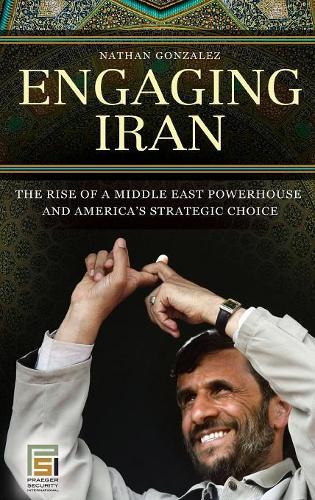
Engaging Iran: The Rise of a Middle East Powerhouse and America's Strategic Choice
(Hardback)
Publishing Details
Engaging Iran: The Rise of a Middle East Powerhouse and America's Strategic Choice
By (Author) Nathan Gonzalez
Bloomsbury Publishing PLC
Praeger Publishers Inc
30th August 2007
United States
Classifications
Tertiary Education
Non Fiction
327.73055
Physical Properties
Hardback
200
Description
Iran is poised to re-emerge as the powerhouse of the Middle East in the 21st century. Already taking on massive export and energy diversification projects and working to acquire a nuclear weapons arsenal, Iran is likely to attain the stature of regional power in the coming years, thanks in no small measure to the vacuum created by the chaos in Iraq, which for many years served as a counterweight to Iran in the region. Gonzalez illuminates the path toward a new approach to engagement with Iran. Only then can the United States reap the benefits of a new Middle East. But is a nuclear-armed Iran a direct strategic threat to the United States While post-revolutionary politics have harnessed anti-Americanism as a matter of policy, Gonzalez argues that this is only a sign of a larger enterprise of democratization; a trajectory of independence, as the author calls it. This trajectory has led Iran to release itself from the shackles of foreign power intervention and has put it closer to home-grown democracy than any other nation in the Muslim Middle East. This promise of democracy, set in the wider scope of Iranian Shi'i jurisprudence and practice, is set to elevate the largest segment of Iranian societyits educated and pro-American youthto the forefront of Iranian politics. The Middle East is in crisis, and within every crisis lies opportunity. America must not repeat the myopic mistakes of the past. A far-sighted and grand-strategic approach to engagement with Iran promises to open doors to regional stability and political development. Only then can America, as the global superpower, reap the benefits of a new Middle East, with the Islamic Republic of Iran at the helm.
Reviews
Gonzalez deserves credit for reflecting Iranians' sentiments, self-image, national aspiration, and historical awareness. Such understanding, although essential for negotiating with Iran, is perhaps most lacking among commentators vociferously prescribing confrontation. The author's recognition of Iran's ancient cultural institutions, the effective progressive role of women from ancient times to the present following Iran's constitutional revolution, and the impromptu vigil in Tehran's streets to express sympathy for 9/11 victims is both helpful and inspiring. Recommended. All levels. * Choice *
Gonzalez (founder, Nationandstate.org, an open-source foreign policy think tank) calls for a new approach for US foreign policy towards Iran grounded in a more sophisticated understanding of Iran's trajectory of independence, a trajectory that may have led to violent resistance to foreign intervention but also has brought Iran closer to homegrown democracy than any country in the neighboring Arab world. He argues that this trajectory of independence has been developing for roughly the past one and a half centuries and that it is set to place Iran's increasingly educated and pro-American youth at the forefront of Iranian politics. He sets this argument next to an analysis of the legacies of recent Presidents Ahmadinejad, Khatami, and Rafsanjani and concludes his discussion with a proposal for engaging Iran and enlisting it as an American ally in the Middle East. * Reference & Research Book News *
Author Bio
Nathan Gonzalez is founder of NationandState.org, an open-source foreign policy think tank. He has published several academic papers on U.S.-Iranian relations and is a regular contributor to various blogs and opinion publications. In 2002, he received a prize from the University of California, Los Angeles for his research on Iraq, in which he predicted that a U.S. invasion would bring about massive sectarian strife, pervasive anti-Americanism in Iraq, and a stronger Iran. Gonzalez holds a bachelor's degree in political science from UCLA and a master of international affairs from Columbia University.
